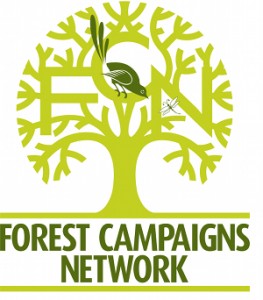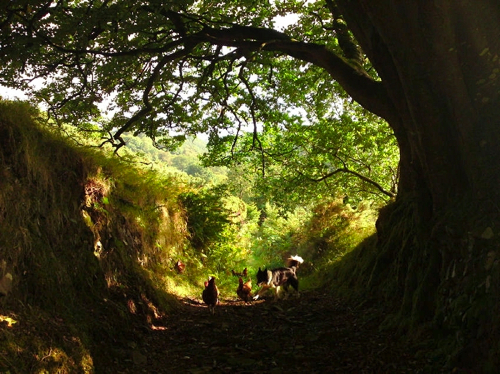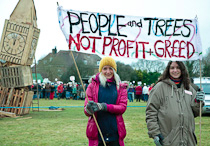Date: 10th Jan 2013
Open Letter to DEFRA ministers Owen Paterson and David Heath and to Chancellor George Osborne
Attached: Public Forest Estate Funding – FCN Briefing Note
In July 2012 the Forests Campaigns Network (FCN) welcomed the findings of the Independent Panel for Forestry (IPF) and were excited to hear that DEFRA had also responded positively to the report, confirming that our Public Forest Estate (PFE) was a priceless national asset with huge public benefits that would remain in public ownership.
We recognise the active engagement from Government following the publication of the IPF report and from this dialogue we felt confident that your department broadly agreed with the recommendations made by the IPF.
However, since this positive first step there has not been any commitment from your department regarding adequate funding of the PFE. With this in mind we, the forest campaign groups (who represent over 500,000 active campaigners nationally) wish to ask for a firm assurance that you will ensure a positive future for a properly funded PFE in England.
Since November 2010, forest campaigners have been fighting for our woodlands. All those who appreciate the value of wooded spaces came together to form a formidable grassroots movement, which proved decisive in the fight to retain the PFE in public ownership. Highly valued by all, as much by inner city kids as the landed gentry, the multitude of benefits for people, wildlife, climate change, and the economy, have been identified and championed by us as well as forming a key part of the IPF report.
Clearly, to ensure the continuation of the benefits provided by the PFE requires investment and a commitment to an adequate level of annual funding. The IPF report (p.55) estimates this annual requirement at £22 million “to maintain the estate’s capital value and sustain the current levels of benefits over time”. Given the estimated value of benefits provided by the PFE at £400 million annually (not including health, cultural and social benefits) we feel that it makes sound economic sense to commit fully to the recommended level of funding.
Whilst we understand the pressure on the public finances we are very concerned that current and future cuts in public spending will see many of these valuable public benefits becoming degraded or disappearing altogether. According to the SR10 program, funding for the PFE is to be reduced from its current level of £20 million to £18 million in 2013, falling to a totally inadequate level of less than £13 million by 2015.
Cuts in PFE funding are already having a negative impact nationally. All Forestry Commission (FC) led educational activities have stopped, many visitor facilities, trails, footpaths and drainage ditches cannot be adequately maintained and in some cases have been closed.
Reductions in FC funding have also resulted in reduced vigilance against illegal felling and vandalism of some woodlands placing further strain on police resources. Volunteer initiatives have collapsed due to lack of funding and qualified staff to train and direct them.
At a time when England’s woodlands and forests face serious threats from disease and climate change –most notably Ash Dieback, a depleted, overburdened FC staff are clearly doing their utmost to protect and preserve the PFE but the acute financial pressure coupled with the prospect of further drastic cuts to their budget is preventing the long-term planning and allocation of resources vital to maintaining the health and public benefits of the PFE and to improve income generation for investment in its future success.
We recognise that the Government has listened to the public regarding ownership and the preservation of our Public Forest Estate, and has also acknowledged the findings of the IPF and the many benefits and values our woodlands provide.
We therefore call on the Government to commit to the proper funding required to maintain the PFE ensuring a positive future for the benefit of ALL rather than allow it to deteriorate due to a lack of resources. The public needs your assurance that the PFE will NOT fail for want of a tiny amount of public money.
Put simply, the level of funding recommended by the IPF required to maintain the Public Forest Estate is a very small commitment of public money for great public benefit.
The people of this country have made it clear how important our forests are and the huge benefits they provide, a message repeated and reinforced by the DEFRA appointed IPF. Will you listen and act accordingly?
Or must campaigners continue to bang the drum?
Sincerely,
The Forest Campaigns Network
Friends of the Lake District
Friends of Thetford Forest
Hands Off Our Forest (HOOF – Forest of Dean)
Keep Our Forests Public
One Voice – New Forest
Our Forests
Save Cannock Chase
Friends of Chopwell Wood
Save Delamere Forest
Save Lakelands Forests
Save Our Woods
Save Sandlings Forest
South West Surrey Save our Woods
Berkshire Save our Woods
Save Kielder
Save Sherwood Forest
CONTACT:
hen at saveourwoods.co.uk
Notes:
1. The accompanying ‘Public Forest Estate Funding – FCN Briefing Note’, looks at the spending review cuts and the very real impact that they are already having on our public forests and the consequences if cuts continue to be imposed. It looks at the very small amount of money needed as a taxpayer contribution to funding the running of the PFE and puts this into the context of total government public sector spending and provides for comparison some examples of spending from other government departments and bodies. It examines these issues under the following headings:
1. Cuts: Spending reviews so far and to come
2. Cuts: Scale and impact
3. Impact of the cuts on our public forest estate on services/public benefits
- Loss of facilities
- Loss of maintenance
- Loss of events and activities
- Activities outsourced
- Impact of loss of FC staff in the forests from cuts in their numbers and from the
- recent restructuring which means that the remaining staff cover much larger
- areas – crime, other problems, neglect, disease, impact on wildlife, loss of
- interaction with public
- Knock-on effect on other organisations
- Impact in general terms
4. Scale of taxpayer funding contribution needed to run PFE
- Independent forestry panel report recommendations
- What this level of funding means for taxpayers; value for money
5. Comparison with other government spending: totals, examples
2. The Forest Campaigns Network was established early in the campaign to save our public forests from sale or other disposals, and continues to bring together forest campaign and user groups from around the country to campaign to ensure that our public forests, and all our woods and forests, are protected and provide the full range of multiple benefits to us all.
Our aim has always been to keep our forests public and properly resourced. We have consistently expressed concerns about the funding of the Forestry Commission, including funding to run the public forest estate (PFE), and our concerns were echoed by the independent forestry panel in its report July 2012.




























Since large areas of our green countryside are apparently going to be covered with housing, largely owing to the fact that this country is overpopulated through slack regulation of immigration, we need all the more to do everything in our power to stop our forests being destroyed. Rainforests are being destroyed the world over, and the results of this are totally to the disadvantage of human life if we would only realise this.